 I ran across a booklet titled, Facebook Bible, and I thought I would share a few of the finer points from this helpful tool. For college students, utilizing Facebook to keep in touch is as easy as breathing. The tools we use on this social networking service come naturally to us, and there are definitely very cool and very uncool ways to use Facebook. Too often, I see businesses that come on Facebook that clearly don’t understand the concept of this network. If you are one of those people, this blog entry is here for your assistance. I encourage anyone utililzing Facebook for business marketing to read the Facebook Bible in its entirety. For now, I have highlighted the most useful items from the pamphlet to assist you in your social networking education.
I ran across a booklet titled, Facebook Bible, and I thought I would share a few of the finer points from this helpful tool. For college students, utilizing Facebook to keep in touch is as easy as breathing. The tools we use on this social networking service come naturally to us, and there are definitely very cool and very uncool ways to use Facebook. Too often, I see businesses that come on Facebook that clearly don’t understand the concept of this network. If you are one of those people, this blog entry is here for your assistance. I encourage anyone utililzing Facebook for business marketing to read the Facebook Bible in its entirety. For now, I have highlighted the most useful items from the pamphlet to assist you in your social networking education.
For an awesome profile page… Not only is your profile the page that you have the most control over, it’s the place where you can most deeply and authentically express your passion for the brand, company, or product you want to promote. If you don’t want to associate your personal identity with the product or service you’re trying to promote, Facebook is not for you. Inherent in the current state of Facebook is a culture of transparency that devalues and ignores inauthenticity.
Starting and joining groups… Groups are the oldest and simplest way to build community around your brand or company on Facebook. By starting a group, you create a central place for customers, partners, and friends to participate in conversations around your brand. Facebook groups come with boards for posting discussion topics, photos, videos, and links right out of the box. You can also easily send news and updates to your group members, for free!
Enhancing your brand with Facebook pages… Pages are more customizable than
groups. You can add HTML, Flash, or even Facebook applications to your pages to extend their functionality and the depth of experience users can have with your brand.
Like what you’re reading? Link to the Facebook Bible to learn more about Facebook events, notes, photos, marketplace, messaging, advertising and networking.
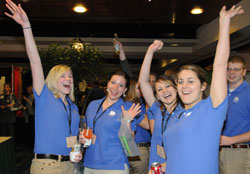 During our Connection Point session tonight the finalists for the NAMA Student Marketing Competition were announced and here they are.
During our Connection Point session tonight the finalists for the NAMA Student Marketing Competition were announced and here they are. and
and  .
.
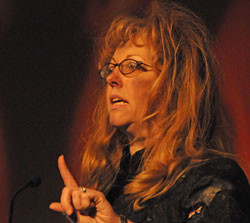 On of our Best of NAMA Award emcees this evening was Sally Behringer,
On of our Best of NAMA Award emcees this evening was Sally Behringer, 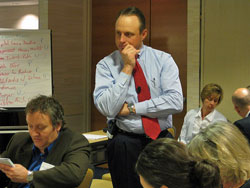 The pre-conference workshop for NAMA 2009 on Wednesday was tailor-made for today’s challenging economic climate.
The pre-conference workshop for NAMA 2009 on Wednesday was tailor-made for today’s challenging economic climate.  Lately, I have been all about social networking. I started my Twitter account in December just to see what it’s all about, and so far, it has been an effective way to communicate with people and market my causes. While I have usually found that college kids are ahead of the curve on most social technology advances, I give the cake to my older colleagues for mastering the art of 140 character marketing. I’m still learning how to utilize my Twitter account to its best potential, and I found two articles by Ron Jones of Search Engine Watch. His Twitter 101 installments have proved incredibly useful in my Twitter learning curve.
Lately, I have been all about social networking. I started my Twitter account in December just to see what it’s all about, and so far, it has been an effective way to communicate with people and market my causes. While I have usually found that college kids are ahead of the curve on most social technology advances, I give the cake to my older colleagues for mastering the art of 140 character marketing. I’m still learning how to utilize my Twitter account to its best potential, and I found two articles by Ron Jones of Search Engine Watch. His Twitter 101 installments have proved incredibly useful in my Twitter learning curve. I ran across a booklet titled,
I ran across a booklet titled, 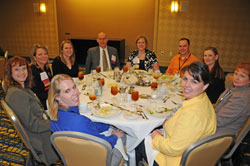 NAMA Chapter Leaders had a workshop then a lunch this morning.
NAMA Chapter Leaders had a workshop then a lunch this morning. 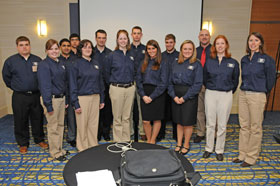 One of our student NAMA chapters had an unfortunate incident on the way here with a flight and did not make it in time to qualify and compete in the student marketing competition.
One of our student NAMA chapters had an unfortunate incident on the way here with a flight and did not make it in time to qualify and compete in the student marketing competition. 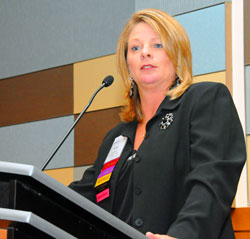 Our NAMA President-Elect, Susie Decker, Farm Progress Companies, spoke to students at their lunch today. She made a very nice gesture and gave out her “tractor numbers” to the group and told them that whoever found them should bring them to her and she would give them her tractor.
Our NAMA President-Elect, Susie Decker, Farm Progress Companies, spoke to students at their lunch today. She made a very nice gesture and gave out her “tractor numbers” to the group and told them that whoever found them should bring them to her and she would give them her tractor.  Sitting out here in the very open ZimmComm/AgWired tweet station I just noticed that
Sitting out here in the very open ZimmComm/AgWired tweet station I just noticed that